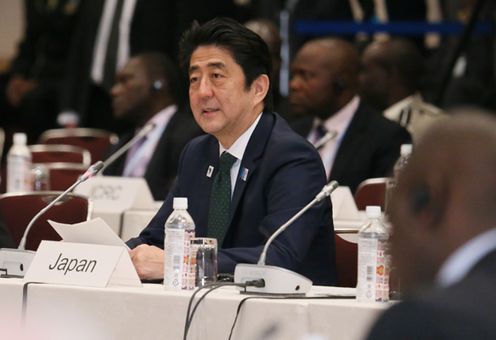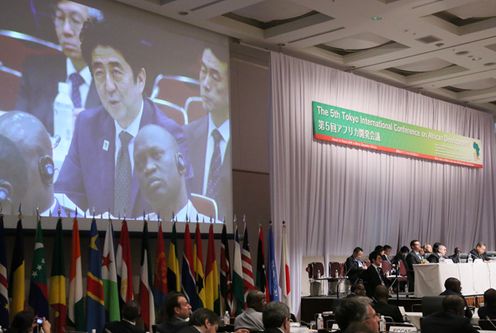Home > News > The Prime Minister in Action > June 2013 > Second Day of TICAD V Plenary Session 3
Second Day of TICAD V Plenary Session 3
Saturday, June 1, 2013

Photograph of the Prime Minister delivering an address at the TICAD V Plenary Session 3 (1)

Photograph of the Prime Minister delivering an address at the TICAD V Plenary Session 3 (2)
Prime Minister Shinzo Abe attended Plenary Session 3 at the Fifth Tokyo International Conference on African Development (TICAD V) being held in Yokohama.
The Prime Minister said in his address,
"Africa is now attracting attention from around the world as a destination for investment while also heading into a virtuous cycle in which private-sector investment elicits further investment.
In Japan, in the lead-up to TICAD V, the government and the business community jointly created the 'Council on Public-Private Partnerships to Promote TICAD V' and engaged in various discussions. The recommendations of this Council were compiled through the cooperation of the public and private sectors, including members such as Mr. Masahiro Sakane, Vice Chairman of Nippon Keidanren (Japan Business Federation) and Mr. Yutaka Kase, Chairman of the Nippon Keidanren Committee on Sub-Saharan Africa. These recommendations provide a valuable viewpoint for both the Japanese government and Africa itself as efforts to expand business with Africa move forward.
While it is true that Africa's abundant natural resources constitute an important business opportunity for resource-poor Japan, we will not simply extract resources and take them back to
Japan. Japan will assist Africa to ensure that the blessings of Africa's natural resources are conducive to Africa's economic growth. Japan held the first 'Japan-Africa Ministerial Meeting for Resources Development' in May in order for us to share in common this type of thinking. In the future, Japan would like to develop this ministerial framework further.
In addition, Africa's markets, now undergoing a tremendous expansion, appeal enormously to Japanese companies beyond natural resources. Japanese companies have a strong enthusiasm for expanding their business relationships towards Africa, which is appealing in these ways.
If we think about it, Africa is the continent that sits solidly at the very center of global distribution. It touches the Mediterranean Sea, the Red Sea, the Indian Ocean, and the Atlantic Ocean. These seas were already developed centuries ago as routes for the material flow of goods.
Perhaps we can think of Africa as the world's largest island, surrounded by bodies of water on all sides. Here, there are abundant resources as well as massive markets. When that island becomes generally peaceful, with roads that run in all directions and a power grid that extends to every corner of the land, we can allow the wings of our imagination fly regarding what an appealing investment destination it will be. For Japan, which entrusts its prosperity and its security to the sea, relations with Africa will surely become important at an accelerated pace in the future, increasing even beyond what we have enjoyed thus far.
Japan intends to join hands with Africa to advance efforts to make Africa a more appealing investment destination. We will implement our 'Strategic Master Plan' in ten countries including Kenya and Mozambique. However, in order for Africa to display that potential, living up to private companies' expectations, Africa itself must consider itself to become an attractive investment destination and make efforts to achieve that.
With regard to this point, the 'Council on Public-Private Partnerships to Promote TICAD V' compiled what is necessary in order for Africa to become a more attractive investment destination into a 'Message from Japan for promoting business with Africa' as the consensus of the Council.
You should already have had this distributed to you today. I very much hope that you take it home and read through it carefully.
What Japanese companies desire from Africa is very clear. It is a free and safe business environment. I have some requests for you who are attending this Conference today. As Japanese companies conduct operations in Africa, please cooperate in ensuring their safety. Do away with excessive regulations and move forward with preparing the necessary legal system, while also bringing about the smooth comings and goings of people and goods. Japan will spare no effort in providing the necessary assistance to achieve these ends.
Finally, I would like to introduce to the Conference one example of the strengths of Japanese companies. That is the practice of 'kaizen,' which means 'continuous improvement.'
Some businesspeople of days gone by who improved the efficiency of Japan's factory production lines taught that, for example, workers should always keep their tools close at hand. Even three steps away was too far. This is because a round trip to get a tool would be six steps in all, and if that were repeated 50 times an hour, it would come to 300 steps altogether. Continuing that for eight hours a day would bring it to 2,400 steps, which meant walking close to two kilometers, all for nothing.
In this way, repeating a small improvement made it possible for Japanese manufacturers to make a high-quality item more cheaply. My friends, this is the revolution that Japanese companies brought to the world. Doing these one by one results in wisdom acquired through practice and ingenuity in the workplace. It is working together and imparting this wisdom and ingenuity hand in hand. I know that nameless Japanese forerunners conveyed to people all around Asia the wisdom and the ingenuity that Japan had cultivated.
Japanese people would like to repeat that in Africa as well. They would like to share with the Africans the kind of culture that can be handed down only on factory shop floors. And it was that workplace culture that triggered miraculous economic growth in Asia. Together with Africa, Japan will prosper. Together with Japan, Africa will thrive. That is the conviction that this TICAD V Conference will implant in us. Thank you very much for listening."

